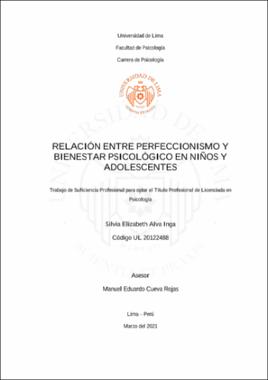Relación entre perfeccionismo y bienestar psicológico en niños y adolescentes

View/
Alva_Inga.pdf
(application/pdf: 688.2Kb)
(application/pdf: 688.2Kb)
Date
2021Author(s)
Advisor(s)
Metadata
Show full item recordAbstract
Perfectionism is a transdiagnostic process of beginning or maintenance that is
significantly related to psychological well-being. Aim of this paper is to identify the
relationship between perfectionism and psychological well-being in children and
adolescents. A systematic search of the studies was carried out in accordance with the
criteria of the PRISMA guide (Urrútia & Bonfill, 2010). The databases used for the
search were: Scopus, Scielo-Scientific Electronic, PubMet, ProQuest, Dialnet and APA
PsycNET. Articles that assess perfectionism and psychological well-being in children
and adolescents were selected for this analysis (n =13). The methodology employed in
the selected research was correlational and mostly cross-sectional. The studies were
measured by psychometric instruments that are reliable and valid. Perfectionism has an
adaptive (healthy) and a maladaptive (unhealthy) component that are associated with
children and adolescent psychological well-being. Researchers are invited to continue
with the study of this problem, which is still little addressed in the Latin American
context. El perfeccionismo es un proceso transdiagnóstico de inicio o mantenimiento que se
relaciona significativamente con bienestar psicológico. El objetivo de este trabajo es
identificar la relación entre perfeccionismo y bienestar psicológico en niños y
adolescentes. Se elaboró una búsqueda sistemática de los estudios respetando los criterios
de la guía PRISMA (Urrútia & Bonfill, 2010). Las bases de datos utilizadas para la
consulta fueron: Scopus, Scielo-Scientific Electronic, PubMet, ProQuest, Dialnet y APA
PsycNET. Se escogieron para el análisis los artículos que evalúan perfeccionismo y
bienestar psicológico en niños y adolescentes (n =13). La metodología empleada en las
investigaciones seleccionadas fue correlacional y en su mayoría transversal. Los estudios
fueron medidos por instrumentos psicométricos que cuentan con fiabilidad y validez. El
perfeccionismo tiene un componente adaptativo (saludable) y un componente
desadaptativo (no saludable) que se asocian con el bienestar psicológico del niño y
adolescente. Se invita a los investigadores a continuar con el estudio de esta problemática
que aún es poco abordada en el contexto latinoamericano.
How to cite
Alva Inga, S. E. (2021). Relación entre perfeccionismo y bienestar psicológico en niños y adolescentes [Trabajo de suficiencia profesional para optar el Título Profesional de Licenciado en Psicología, Universidad de Lima]. Repositorio Institucional de la Universidad de Lima. https://hdl.handle.net/20.500.12724/13171Publisher
Universidad de LimaCollections
The following license files are associated with this item:

